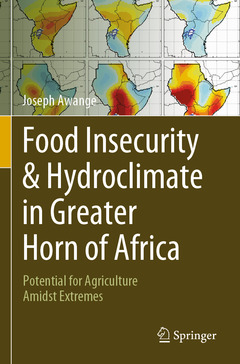Food Insecurity & Hydroclimate in Greater Horn of Africa, 1st ed. 2022 Potential for Agriculture Amidst Extremes
Auteur : Awange Joseph

This book will benefit users in food security, agriculture, water management, and environmental sectors. It provides the first comprehensive analysis of Greater Horn of Africa (GHA)?s food insecurity and hydroclimate using the state-of-the-art Gravity Recovery and Climate Experiment (GRACE) and its Follow-on (GRACE-FO)?s, centennial precipitation, hydrological models? and reanalysis? products. It is here opined that GHA is endowed with freshwater (surface and groundwater) being home to the world's second largest freshwater body (Lake Victoria) and the greatest continental water towers (Ethiopian Highlands) that if properly tapped in a sustainable way, will support its irrigated agriculture as well as pastoralism. First, however, the obsolete Nile treaties that hamper the use of Lake Victoria (White Nile) and Ethiopian Highland (Blue Nile) have to be unlocked. Moreover, GHA is bedevilled by poor governance and the ``donor-assistance? syndrome; and in 2020-2021 faced the so-called ``triple threats?? of desert locust infestation, climate variability/change impacts and COVID-19 pandemic. Besides, climate extremes influence its meagre waters leading to perennial food insecurity. Coupled with frequent regional and local conflicts, high population growth rate, low crop yield, invasion of migratory pests, contagious human and livestock diseases (such as HIV/AIDs, COVID-19 & Rift Valley fever) and poverty, life for more than 310 million of its inhabitants simply becomes unbearable. Alarming also is the fact that drought-like humanitarian crises are increasing in GHA despite recent progress in its monitoring and prediction efforts. Notwithstanding these efforts, there remain challenges stemming from uncertainty in its prediction, and the inflexibility and limited buffering capacity of the recurrent impacted systems. To achieve greater food security, therefore, in addition to boosting GHA's agricultural output, UN Office for the Coordination of Humanitarian Affairs suggest that its ?inhabitants must create more diverse and stable means of livelihood to insulate themselves and their households from external shocks?. This is a task that they acknowledge will not be easy as the path ahead is ?strewn with obstacles namely; natural hazards and armed conflicts?. Understanding GHA?s food insecurity and its hydroclimate as presented in this book is a good starting point towards managing the impacts of the natural hazards on the one hand while understanding the impacts associated with extreme climate on GHA's available water and assessing the potential of its surface and groundwater to support its irrigated agriculture and pastoralism would be the first step towards ?coping with drought? on the other hand.
The book represents a significant effort by Prof Awange in trying to offer a comprehensive overview of the hydroclimate in the Greater Horn of Africa (GHA). Prof Eric F. Wood, NAE (USA); FRSC (Canada); Foreign member, ATSE (Australia).
Provides the first comprehensive analysis of GHA's groundwater using state-of-the-art GRACE satellite
Offers the first quantification of GHA's drought using centennial precipitation products
Presents the first characterization of drought characteristics associated with coupled ocean–atmosphere phenomena
Date de parution : 01-2023
Ouvrage de 425 p.
15.5x23.5 cm
Disponible chez l'éditeur (délai d'approvisionnement : 15 jours).
Prix indicatif 168,79 €
Ajouter au panierDate de parution : 01-2022
Ouvrage de 425 p.
15.5x23.5 cm
Disponible chez l'éditeur (délai d'approvisionnement : 15 jours).
Prix indicatif 168,79 €
Ajouter au panierThème de Food Insecurity & Hydroclimate in Greater Horn of Africa :
Mots-clés :
Water; Drought; Extreme Climate; Food Security; Agriculture; Coupled ocean-atmosphere phenomena



